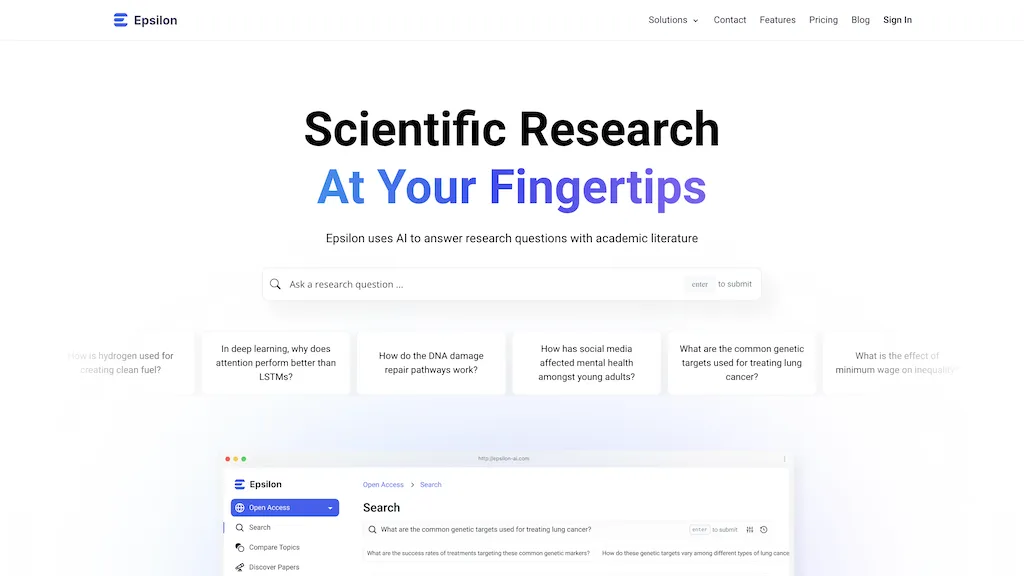What is Epsilon?
Epsilon is an AI-powered search engine that would make scientific research a lot easier. It gives instant access to millions of pieces of academic literature, allowing users to ask research questions and receive in-depth, ChatGPT-like responses with inline references to the applicable passages. This virtual assistant will be useful for researchers who need to identify key publications and patents and verify claims contained in the literature.
It leverages the power of the rich dataset from Semantic Scholar and GPT-4 technology in concert to achieve results that are both factual and authentic. Additionally, it adheres to user privacy by anonymizing search queries and their storage; thus, this tool is effective for academic and scientific works.
Key Features & Benefits of Epsilon
-
Research answer:
Ask a research question-specific question and get an elaborative answer with relevant citations. -
Scanning the long list of research papers:
It allows the user to scroll through thousands of academic literature with a glimpse of the insight into relevant information. -
Generation of relevant citations:
Epsilon helps create correct citations of research output. -
Support and questions:
The tool offers reliable insight and answers to research-related questions. -
Speedy and Reliable research insight:
Epsilon avails insight into the research with speed; thus, it will be easier to review new research questions or search for prior art.
These collectively enhance efficiency and effectiveness in scientific research using Epsilon for academics, researchers, and students.
Use Cases and Applications
Epsilon is an all-inclusive platform with a wide range of applications in the scientific and academic communities. Its applications include:
-
Research Access:
Researchers can quickly gain access to academic literature and-most importantly-get quick answers with inline references that help facilitate claim validation and the evaluation of new research questions. -
Literature Reviews:
Academics are able to find relevant publications and patents, synthesize papers, and organize research libraries in order to create more comprehensive literature reviews. -
Trustworthy Results:
Scientific professionals are taking advantage of the extensive libraries Epsilon can run searches against for fact-based and trustworthy results of their queries all while keeping user privacy.
The users of Epsilon are researchers, academics, and students who want to have a trusted, quick way of going through academic literature and gaining reliable insights on research.
How to Use Epsilon
Using Epsilon is easy and intuitive:
-
Create Account:
Open an account on the Epsilon platform. -
Formulate Research Questions:
Compose your research questions in specific detail via the search bar. -
Go Through Results:
Browse through the results, which include detailed answers and inline references. -
Save and Organize:
Save relevant papers to your personal library and organize your research materials in a way that makes accessing them easy and efficient. -
Synthesize Papers:
Upload papers to get robust summaries and run searches across your entire library.
To get the most out of Epsilon, ensure to leverage its synthesis capabilities and privacy features that go a long way in maintaining the confidentiality of your research.
How Epsilon Works
Epsilon draws on the latest AI technologies and massive academic data sets to achieve its results, as described below.
-
Underlying Technology:
It is based on GPT-4 technology with Semantic Scholar for ensuring only the best and most accurate results. -
Algorithms and Models:
Advanced algorithms to interpret research questions and give comprehensive answers with citations. -
How it Works:
The platform anonymizes the search queries, leverages access to a deep repository of academic literature, and returns results in a usable format.
This technical architecture ensures that the users receive high-value, reliable research output without compromising their privacy in any form.
Pros and Cons of Epsilon
Following is a list of a few advantages and possible disadvantages of using Epsilon:
Pros:
- Immediate access to a deep repository of academic literature
- Detailed responses
- Your privacy: your search queries are anonymized.
- Advanced synthesis capabilities for uploaded papers.
Cons:
- The tool may require some learning curve to those who have not used it earlier for the fullest utilization.
- Subscription plans can be somewhat expensive to some users, especially professional and organizational plans.
Generally, the user feedback speaks about the efficiency and reliability of the tool. However, for some users, the cost of advanced plans can turn out to be a limitation.
Conclusion about Epsilon
Epsilon is the powerful AI-driven search engine that really makes scientific research more efficient and reliable. Among the key features, detailed answers to research questions, vast synthesis capabilities, and a notion of privacy make it priceless for any researcher, academic employee, or student.
While there are those who might consider the advanced plan costs a little too pricey, for the serious researcher, the value that comes from the strong features and reliable results Epsilon provides is money well spent. The platform is still very much in development, which means even further advanced features and capabilities can be expected in the future.
Epsilon FAQs
-
What is Epsilon?
Epsilon is an AI-powered search platform for scientific research; it maintains a huge academic literature repository and provides extensive insight into research studies. -
How does Epsilon ensure data privacy?
Epsilon anonymizes search queries and stores data to place user privacy first. -
Who is Epsilon for?
Epsilon will be beneficial for researchers, academics, and students in terms of scientific research. -
How much does Epsilon cost?
Epsilon has a free plan, a student plan at $108 yearly, a professional plan for $228 yearly, and then enterprise pricing upon request. -
How do I get started in Epsilon?
You sign up for an account, type in your research questions, review your results, and use the synthesis and organization features to manage your research.










